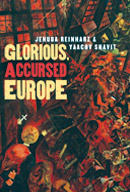Loving and Leaving Europe

According to a recent report in the European press, dozens of French Jews who, in the aftermath of World War II, were compelled to adopt Gallic-sounding names are now demanding to be allowed to revert to their Jewish originals. There is a deep irony here: the supposedly Jewish names being reclaimed are in fact the artificial and often arbitrary ones originally imposed in 1787 by the Austrian emperor, Joseph II, as part of his larger aim of integrating the Jews of Central Europe into Germanic society and culture.
What this story really highlights is a much larger issue—the complicated, torturous, and often misconstrued relationship between the Jews and their European heritage. That issue is the subject of a fascinating new book, Glorious, Accursed Europe. In this broadly conceived historical study, Jehuda Reinharz and Yaakov Shavit brilliantly bring to light a complex skein of modern Jewish attitudes to Europe, ranging from unabashed love and patriotism to undisguised contempt.
The latter was especially pronounced in Zionist thought. In the dominant narrative of Zionist history, it was deep disillusion with the failed promise of Europe to its Jews—triggered by the Russian pogroms of the early 1880's and intensified by the fallout from the Dreyfus Affair in France a decade later—that led pioneering figures like Leo Pinsker and Max Nordau to pronounce Europe terminally infected with the incurable disease of anti-Semitism. Given this chronic and eternal hatred, the only option for Jews was to abandon Europe, body and soul, for Palestine. Zionism thus stood for the rejection of all that Europe represented for Jewish history, a blanket repudiation that in doctrinal Zionist thought would later be dubbed shelilat hagolah, or negation of the Diaspora.
Reinharz and Shavit beg to differ. The case of Theodor Herzl, whose utopian vision for the future Jewish state took the form of a thoroughly Western entity transplanted to the Middle East, is well known. But, as the authors show, more radical Zionist ideologues than Herzl harbored similarly romantic attachments to Europe's highest cultural and political values.
Neither Ze'ev Jabotinsky, who famously called for the Jews' "evacuation" of Europe lest they be buried in its "volcanic ashes," nor the poet Uri Zvi Greenberg, for whom Europe was a "deathly poison," its art and philosophy a mere mask behind which flowed "the dark blood of murderers," was immune to Europhilia. Both failed to foresee that the destruction of European Jewry would emanate from cosmopolitan Germany rather than from, as they imagined, the primitive Slavic east. Greenberg, who in Hebrew and Yiddish penned the most powerfully anti-European sentiments in Jewish literature, nevertheless envisaged Zionism as a movement to transform the Jews into "a landed people in the Arab sea, like a European lighthouse," while Jabotinsky claimed Europe's very soul for the Jews: "Europe, from a moral point of view, is ours . . . its culture part and parcel of Judaism."
And what of David Ben-Gurion, whose heroic moniker, "The Lion's Son," had replaced his discarded European surname Green, who would never be seen wearing a necktie, and who spent his final years in his kibbutz, that most quintessential of Zionist institutions? Reinharz and Shavit report, among other things, the great nationalist leader's statement to the eighteenth Zionist Congress in 1935: "We are returning to the Orient, but we bring the enlightenment of Western culture to the land . . . where we will preserve the eternal contacts with . . . Europe and America."
Ben-Gurion was hardly alone in Hebraizing his name. A great many European immigrants did likewise, sloughing off, in the process, other cosmetic aspects of European manners and mores as well. Yet, as Reinharz and Shavit argue, not only were the deeper structures of Western Europe transposed to Palestine, but they undergirded the greatest achievements of Israeli history. Tel Aviv, the metropolitan symbol of the new Hebrew society, became the Bauhaus capital of the world, its café-lined boulevards modeled after Europe's. Similarly, Israel became and remains a center of European classical music, opera, and the plastic arts. It became, in the authors' felicitous phrase, "a European world in Jewish dress."
To this day, Israel's enemies taunt it as a typical colonialist nation-state. Reinharz and Shavit vigorously rebut the charge. While influenced by the highest European ideals, Israel's founders were for the most part stateless refugees escaping Europe's hatred of them and their kind—hardly the representatives of the continent's imperial interests. And yet the charge and others like it recur, and lately with an almost obsessive intensity: salient reminders of the unresolved and ceaselessly vexing relationship between the modern Hebrew nation and the European seedbed from which it emerged and was brutally expelled.
Allan Nadler is professor of religious studies and director of the program in Jewish studies at Drew University.
Comments are closed for this article.





The Hebrew title of the book is "Europa: Ahuvah ve-Senuah." A much better English translation of the title would have been "Europe: Desired and Despised"